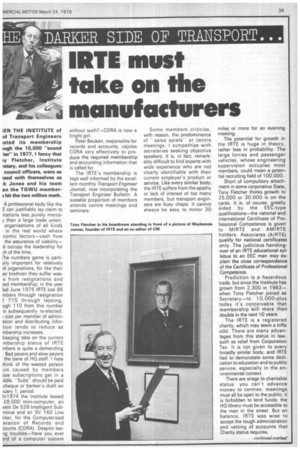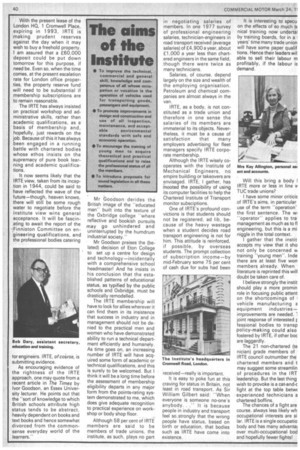IRTE must take on the manufacturers
Page 29

Page 30

If you've noticed an error in this article please click here to report it so we can fix it.
IEN THE INSTITUTE of Id Transport Engineers isted its membership nigh the 10,000 "sound ier" in 1977, I fancy that iy Fletcher, Institute retary, and his colleagues council officers, were as ised with themselves as k Jones and his team en the TGWU member) hit the two million mark.
A professional body like the E can justifiably lay claim to irations less purely mercet than a large trade union, organisations of all kinds in the real world where nomic factors—cash flow the assurance of viability — 31 occupy the leadership for :h of the time.
Ehe numbers game is parti3rly important for relatively lI organ istions, for like their ler brethren they suffer wase from resignations and ;ed membership; in the year led June 1975 IRTE lost 86 mbers through resignation 1 775 through lapsing, ugh 110 from this number 'e subsequently re-elected. cost per member of admination and distributing infortion tends to reduce as mbership increases.
In1974 the Institute leased £8,000 mini-computer, an vetti De 529 Intelligent Submina' and an SV 160 Line nter, for the Computerised eration of Records and :ounts (CORA). Despite teeig troubles—have you ever ard of a computer system without such?—CORA is now a bright girl. Peter Beuken, responsible for records and accounts, cajoles CORA very effectively to produce the required membership and accounting information that is called for. The IRTE's membership is kept well informed by the excellent monthly Transport Engineer Journal, now incorporating the Transport Engineer Bulletin A sizeable proportion of members attends centre meetings and seminars. Some members criticise, with reason, the predominance of "sales spiels" at centre meetings. I sympathise with secretaries seeking objective speakers. It is, in fact, remarkably difficult to find experts with wide experience who are not clearly identifiable with their current employer's product or service. Like every similar body, the IRTE suffers from the apathy or lack of interest of too many members, but transport engineers are busy chaps. It cannot always be easy to motor 30 miles or more for an evening meeting, The potential for growth in the IRTE is huge in theory, rather less in probability. The large lorries and passenger vehicles, whose engineering supervision occupies most members, could mean a potential recruiting field of 100,000. Short of compulsory attachment in some corporative State, Tony Fletcher thinks growth to 25,000 or 30,000 is on the cards. It is, of course, greatly aided by the EEC-type qualifications—the national and international Certificate of Professional Competence is given to MIRTE and AMIRTE holders. Associates (AIRTE) qualify for national certificates only. The judicious handingover of an IRTE educational syllabus to an EEC man may explain the close correspondence of the Certificate of Professional Competence. Prediction is a hazardous trade, but since the Institute has grown from 2,300 in 1963 — when Tony Fletcher joined as Secretary—to 10,000-plus today it's conceivable that membership will more than double in the next 10 years. The IRTE is a registered charity, which may seem a trifle odd. There are many advantages from this status in law, such as relief from Corporation Tax. It is not given to every broadly similar body, and IRTE had to demonstate some dedication to education and to public .service, especially in the environmental context. There are snags to charitable status: you can't advance money to centres; meetings must all be open to the public; it is forbidden to lend funds; the Ha library must be accessible to the man in the street. But on balance. IRTE was wise to accept the tough administration and vetting of accounts that Charity status requires. With the present lease of the London HQ, 1 Cromwell Place, expiring in 1993, IRTE is making prudent reserves against the day when it may wish to buy a freehold property. I am assured that a £60,000 deposit could be put down tomorrow for this purpose, if need be. Even so, when the time comes, at the present escalation rate for London office properties, the property reserve fund will need to be substantial if membership subscriptions are to remain reasonable. The IRTE has always insisted on practical workshop and administrative skills, rather than academic qualifications, as a basis of membership and, hopefully, just rewards on the job. Because of this it has always been engaged in a running battle with chartered bodies whose ethos insists on the supremacy of pure book learning and academic qualifications. It now seems likely that the IRTE view, taken from its inception in 1944, could be said to have reflected the wave of the future—though, heaven knows, there will still be some rough water to negotiate before the institute view wins general acceptance. It will be fascinating to await the report of the .Finniston Committee on engineering qualifications, and the professional bodies catering for engineers. IRTE, of course, is submitting evidence. As encouraging evidence of the rightness of the I RTE approach, one may quote from a recent article in The Times by Ivor Goodson, an Essex University lecturer. He points out that the "sort of knowledge to which British schools attribute high status tends to be abstract, heavily dependent on books and text books and hence somewhat divorced from the commonsense everyday world of the learners." Mr Goodson derides the British image of the "educated man" built into the texture of the Oxbridge college "where reflective and bookish pursuits may go unhindered and uninterrupted by the humdrum industrial society."' Mr Goodson praises the (belated) decision of Eton College to set up a centre for design and technology—incidentally with a comprehensive school headmaster! And he insists in his conclusion that the established patterns of educational status, as typified by the public schools and Oxbridge, must be drastically remodelled. The IRTE membership will have to look for allies wherever it can find them in its insistence that success in industry and in management should not be denied to the practical men and women who have demonstrated ability to run a technical department efficiently and humanely. As time goes on, an increasing number of 1RTE will have acquired some form of academic or technical qualifications, and this is surely to be welcomed. But I think it will be a long time before the assessment of membership eligibility departs in any major form from the points-rating system demonstrated to me, which does give adequate recognition to practical experience on workshop or body shop floor. Although 58 per cent of I RTE members are said to be members of trade unions, the institute, as such, plays no part in negotiating salaries of members. In one 1977 survey of professional engineering salaries, technician-engineers in road transport received (average salaries) of £4,900 a year, about £1,000 a year less than chartered engineers in the same field, though there were twice as many technicians. Salaries, of course, depend largely on the size and wealth of the employing organisation. Petroleum and chemical companies are almost always in the van. IRTE, as a body, is not constituted as a trade union and therefore in one sense the salaries of its members are immaterial to its objects. Nevertheless, it must be a cause of satisfaction that many employers advertising for fleet managers specify IRTE corporate membership. Although the IRTE wisely cooperates with the Institute of Mechanical Engineers, no empire building or takeovers are envisaged. IRTE, I gather, has Mooted the possibility of using its computer facilities to help the Chartered Institute of Transport monitor subsciptions. One of IRTE's profound convictions is that students should not be registered, ad lib, because of the heavy wastage when a student decides road transport engineering is not for him. This attitude is reinforced, if possible, by overseas students. The prompt collection of subscription income—by mid-February some 75 per cent of cash due for subs had been received—really is important. It is easy to poke fun at this craving for status in Britain, not least in road transport. As Sir William Gilbert said: "When everyone is someone no-one's anybody. . ." It is because people in industry and transport feel so.strongly that the wrong people have status, based on birth or education, that bodies such as IRTE have come into existence. It is interesting to specu on the effects of so much I( nical training now undertal by training boards, for in a years' time many trade union will have some paper qualif tions. Hence their leaders wil able to sell their labour m profitably, if the labour it demand. Will this bring a body I IRTE more or less in line v TUC trade unions? I have some minor criticit of IRTE's aims, in particular use of the term "operation' the first sentence. The w, "operator"' applies to tra management as much as to fl engineering, but this is a mi niggle in the total context. I gather that the instit accepts my view that it sho not only be concerned w training "young men". lnde there are at least five won members already. When literature is reprinted this will doubt be taken care of. I believe strongly the instil should play a more promin role in focusing public attent on the shortcomings of vehicle manufacturing a equipment industries— improvements are needed. joint response of interested r fessional bodies to transp policy-making could also fostered by IRTE, if other boc are laggardly. The 21 non-chartered (te nician) grade members of IRTE council outnumber the chartered members and t may suggest some streamlin of procedures in the IRT leadership. But the last thing wish to provoke is a cat-and-c fight at the top table betw( experienced technicians a chartered boff ins. The chances of a fight are course, always less likely wh occupational interests are si lar. IRTE is a single occupatio body and has many advantal over multi-occupational boci and hopefully fewer fights!
















































































